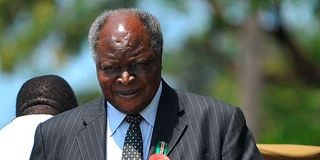Premium
Kibaki in the league of global icons

Former president Mwai Kibaki.
Different countries have been led by all sorts of leaders. These include autocrats like Mobutu Seseseko of Zaire, Mugabe of Zimbabwe, Mao of China, Stalin of USSR, Hitler of Germany and Mussolini of Italy. These autocrats have caused deaths and suffering among their citizens. Mao Zedong, for example, the founder of the People’s Republic of China (PRC), was chairman of the Chinese Communist Party from 1949 until his death in 1976.
In 1957, he commenced a campaign in which at least 550,000 people, mostly intellectuals and dissidents, were persecuted. In 1958, he launched the ‘Great Leap Forward’, whose goal was to rapidly transform China’s agrarian economy to an industrial one.
It led to the deadliest famine in history and the deaths of 15–55 million people between 1958 and 1962. In 1966, he initiated the 10-year Cultural Revolution to remove “counter-revolutionary” elements in society. It was marked by a violent class struggle, widespread destruction of cultural artifacts and an unprecedented elevation of Mao’s personality cult. Millions were persecuted during the revolution.
Mugabe led Zimbabwe between 1987 and 2017. In 1982–1987, his Fifth Brigade crushed Zapu-linked opposition in Matabeleland in a campaign that killed at least 10,000 people. From 2000, he encouraged black Zimbabweans to violently seize white-owned farms. Food production was severely impacted, leading to famine, economic decline and foreign sanctions.
Six million Jews
Hitler led Germany between 1933 to 1945. His regime was responsible for the genocide of about six million Jews and millions of others that he and his followers deemed socially undesirable.
He was responsible for the killing of an estimated 19.3 million civilians and prisoners of war. Moi has been categorised in this group by virtue of the systemic rights abuses in his reign, particularly the tribal clashes of 1992 and 1997 and the economic woes of the 1990s.
Another category of leaders consists of ‘the averages’. They do not occasion much harm to society, but neither do they cause any great leap forward .They often commit honest mistakes. The best example would be most Tanzanian presidents. Save for Magufuli, whose regime was veering towards autocracy, most have neither caused much harm nor major strides forward. Barack Obama of the US might also fall into this group.
The third category comprises those that transform countries positively within a generation. They include Deng Xiaoping of China, Franklin Roosevelt of the US, Yen Kuan Lew of Singapore and Prime Mininster Clement Attlee of the UK. Kibaki falls in this category.
Deng Xiaoping was a Chinese statesman and paramount leader of the PRC from December 1978 to November 1989. He was among the revolutionaries that had established Communist Party in the 1920s and occupied top posts when the party took power in 1949.He fell out with Mao during cultural revolution period and was sidelined .
Likewise, Kibaki joined Kanu in 1962 and rose to become Kenya’s Vice-President in 1978. He was sidelined by President Moi in 1988 and, like Deng, Kibaki took the relegation calmly. Just like Kibaki in 2002, Deng inherited a country beset with institutional disorder. After Mao Zedong’s death in 1976, Deng would later become the “Architect of Modern China”. Kibaki did the same with Kenya .He inherited a country that was collecting less than Sh200 billion taxes per annum.
Kibaki undertook economic reforms that saw banks hawk loans to ordinary Kenyans and collection of taxes quadrupled . The stock market became very vibrant and unemployment fell to record lows. Key infrastructural projects were established. Like Kibaki, Deng eschewed ostentatious display of power. He never held office as either China’s head of state or head of government, nor as the head of the Communist Party. Everyone knew he was the paramount leader, though. Kibaki refused to have any project named after him.
War Cabinet
Attlee was British Prime Minister from 1945 to 1951. He was Deputy Prime Minister during the wartime coalition government under Winston Churchill. As the European front of WWII reached its conclusion, the war Cabinet headed by Churchill was dissolved and elections were scheduled. The Labour Party led by Attlee recorded a landslide but shock victory in the 1945 general election. Attlee inherited a country that was close to bankruptcy and beset by food, housing and resource shortages. Like Kibaki, his signature programmes, such as health reforms, remain to date.
Lee Kuan Yew was Prime Minister of Singapore between 1959 and 1990. Lee oversaw Singapore’s transformation into a developed country with a high-income economy within a single generation. Like Kibaki, Lee disliked populist policies in favour of long-term economic planning.
Like every other leader, Kibaki had his own demerits. Whereas he allowed free speech and expanded the political space, his falling-out with Raila in 2005 planted the seeds of the 2007/8 post-election chaos.
Dr Irungu Kang’ata teaches law at Catholic University of Eastern Africa. He is the Murang’a Senator and a former Chief Whip of the Senate.





